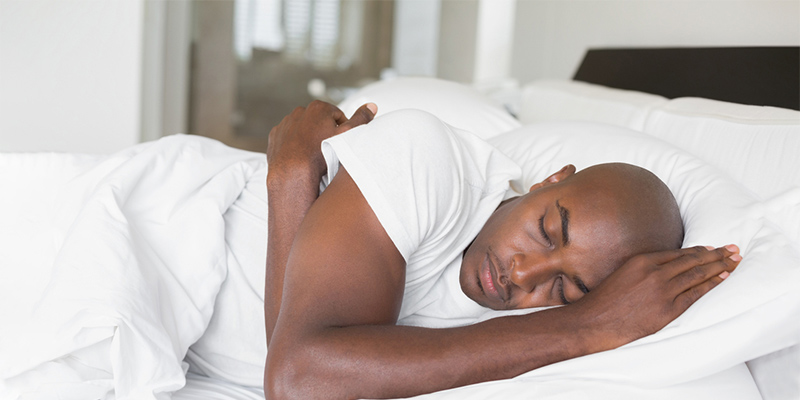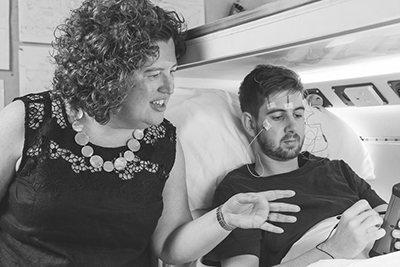Are you getting enough sleep?
By Melissa Keogh
 HUMANITIES
HUMANITIESSleep – it’s as essential as breathing and as crucial as eating. But are we getting enough shut-eye?
“No,” says Professor Siobhan Banks, co-director of UniSA’s Behaviour-Brain-Body Research Centre.
“We’re seeing quite a significant number of the population getting less than six hours of sleep a night and this is leading to all sorts of issues with productivity at work, significant sleepiness leading to accidents on the road and costing businesses a lot of money.”
The Behaviour-Brain-Body Research Centre is home to one the premier sleep research facilities in Australia with a sleep laboratory led by experts in human sleep, biological rhythms, sleep disorders, cognitive neuroscience, shift work and patient safety.
 Prof Siobhan Banks’s research examines the impact of sleep deprivation and shift work on psychological and physiological functioning. Photo: Defence Innovation Partnership.
Prof Siobhan Banks’s research examines the impact of sleep deprivation and shift work on psychological and physiological functioning. Photo: Defence Innovation Partnership.Prof Banks has dedicated much of her research career to exploring the impacts of sleep deprivation and shift work on psychological and physiological functioning and what can be done to prevent the detrimental effects of disturbed sleep.
“It’s really about thinking how we can improve sleep for everybody. We can’t stop shift work and new parents can’t suddenly sleep walk,” she says. “So how can we help everybody within their lifestyle manage their fatigue and sleep better?”
Prof Banks is a board member of the Sleep Health Foundation which in 2017 released a report, prepared by Deloitte Access Economics, that investigated the economic consequences of poor sleep.
The report, Asleep on the Job: Counting the Cost of Poor Sleep, estimated that inadequate sleep was believed to cost the Australian economy $66.3 billion in 2016/17 including productivity losses of $17.9 billion.
It also estimated that almost 40 per cent of Australian adults experience some form of inadequate sleep – something which can have fatal consequences while driving on the road or contribute to work-related accidents. Chronic inadequate sleep can also cause heart disease, obesity, depression and a range of other serious health issues.
With sleep being an integral part of our lives (the average human spends one third of their life sleeping) long periods of sleep enable us to survive, allowing our bodies to restore and rejuvenate, grow muscle, repair tissue and synthesise hormones.
Prof Banks says there two basic types of sleep – rapid eye movement (REM) sleep, which is quite active, and non-REM sleep which is non-active.
“The sleep that’s not (active) is the deep stage where it takes a lot for you to wake up. It’s that stage you’re very relaxed, your breathing slows, your temperature stays low, your body stops metabolising, stops producing urine, it’s where your brain really shuts down and enables a period of rest and recovery,” she says.
Prof Banks says the whole process of sleep is important, meaning that if a person isn’t getting enough sleep or is disrupting the structure of sleep, they miss out on not entering these deep stages of sleep, as well as dreaming sleep.
“A lot of people only get by on 5-6 hours of sleep which isn’t really enough, and we know that that’s related to a whole bunch of other health-related conditions. Shift workers are trying to sleep at times when our body is really primed to be awake.”
Poor sleep quality is something affecting shift workers or those working outside of the usual nine-to-five day. Prof Banks says much of our physiology and how we metabolise food is linked to daytime hours, when our bodies are used to getting food and can metabolise it properly.
Shift workers on the other hand are awake and eating through the night, even though their bodies aren’t prepared for receiving food. Prof Banks says the disruption of these internal body clocks is putting shift workers at increased risk of obesity and Type 2 diabetes.
UniSA is currently working on a study, with funding from the University of Adelaide and the National Health and Medical Research Council, to investigate altering meals times to reverse metabolic consequences of shift work.
Preliminary research undertaken on rodents found that rats that fasted during a simulated night shift environment suffered fewer ill effects than the rats that ate during the night.
This study led to a small-scale pilot study on five human male volunteers at the Behaviour-Brain-Body Research Centre before a much larger male and female study commenced. Data is currently being accumulated, with the aim of helping form industry recommendations and policy guidance, leading to a reduction in metabolic disease in shift workers.
As for other sleep disrupters in 21st century life, the impact of smartphones on sleep is a cause of debate for sleep experts, Prof Banks says.
“There is quite a bit of debate in our field whether these items of technology are affecting our sleep because of the light emitted from the screen or whether it’s more to do with the psychological effect of having emails, playing games or texting late into the night,” she says.
“But I think the amount of technology that we have in our lives, and the amount of technology that we rely on, is definitely meaning that sleep is becoming less of a priority.”
So how much sleep does the average human actually need and can we survive on as little as four or five hours a night?
“You’re probably looking at 7-8 hours as the optimal amount of sleep … but some people are just naturally able to get away with a shorter amount, and some people need a much longer amount. Generally, people know themselves how much they need,” Prof Banks says.
“We know there are a lot more people living on 4-5 hours a night than there actually should be. While there are some people who can do it, the majority of adults need more like seven, but those numbers are different for children, teenagers and older people as well.”
This article was originally published in Brand SA News and is republished courtesy of Brand South Australia.
Earlier this month, Prof Banks received the Award for Excellence in Promoting Industry Engagement in Graduate Research from the Australian Council of Graduate Research.
Other Stories
- How many cups of coffee increase your risk of high blood pressure, heart disease?
- The art of the circus: Cartwheeling kids to better mental health
- Engineering students’ future careers through upgraded facilities
- World Solar Challenge to test new energy strategy for solar industry
- From the Vice Chancellor
- Achievements and Announcements
- Are you getting enough sleep?
- How your brain can fake pain
- Australia’s ‘watergate’: here’s what taxpayers need to know about water buybacks
- Exceptional achievements acknowledged in first graduations of 2019
- Cancer researchers join bike tour pedalling towards a cure
- Defence and the bench: the cause of dwindling football scores
- The latest books from UniSA researchers
- In Pictures



